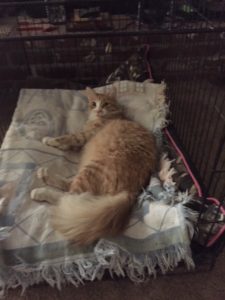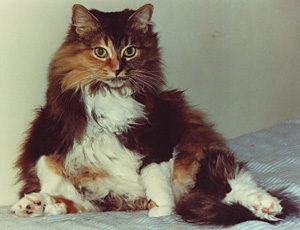 Today is weigh-in day for my mother’s cat, Smokey. He had a urinary tract blockage in January and was put on a special diet. In the process he has lost some weight. After discussing with the veterinarian exactly how much he should be eating, and putting him on a more regular feeding schedule, we need to check his weight today. Cross fingers he is either holding his own or even gaining back to where he was.
Today is weigh-in day for my mother’s cat, Smokey. He had a urinary tract blockage in January and was put on a special diet. In the process he has lost some weight. After discussing with the veterinarian exactly how much he should be eating, and putting him on a more regular feeding schedule, we need to check his weight today. Cross fingers he is either holding his own or even gaining back to where he was.
Weight gain or loss of a pound or more can be crucial in determining a cat’s level of health and well-being. A loss or a serious gain is telling to his veterinarian. In fact you may notice that anytime you take your cat to the vet, he gets weighed. If there’s a change in the cat’s weight, you might be interrogated: what has he been eating? how much? any changes in is activity? etc. And you might go home with instructions—more interaction with your overweight cat, toys that dispense treats when played with, maybe creative climbing  options or opportunities. For one that is losing weight, you might be instructed to change her diet, feed on a more regular basis, give a more calorie enriched food, etc.
options or opportunities. For one that is losing weight, you might be instructed to change her diet, feed on a more regular basis, give a more calorie enriched food, etc.
It’s a good idea for you to check on your cat’s weight between vet checks, as well. It’s hard to tell through all that fur just by looking when a cat is gaining or losing. Next time you come home from your veterinarian’s office, note your cat’s weight. Then climb on your scale with him and see how it compares. Make a note of his start weight on your scale and weigh fluffy every few weeks.
Often it takes someone who sees your cat only occasionally to notice a weight gain or loss. So if a neighbor or friend says something, pay attention and respond accordingly.
Keep in mind that weight gain or loss can be an early indicator of an underlying health problem.





